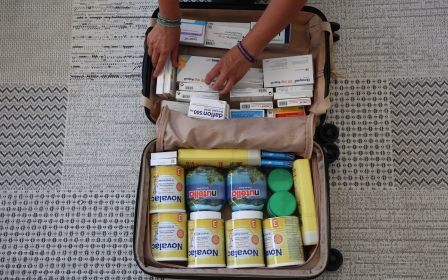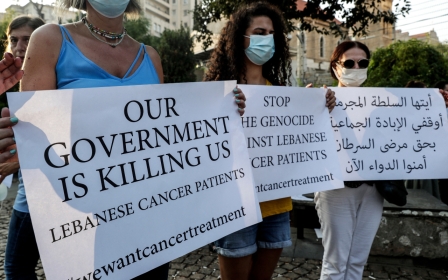Lebanon: Anger over infant's death after hospitals refused her entry

Lebanese citizens have taken to social media to express anger over the death of one-year-old Yasmine al-Masri, who passed away on Sunday after being refused entry into four hospitals in north Lebanon.
Reports said that one of the hospitals demanded a payment of $1000 to treat the sick infant following initial tests, which the family could not pay. The other hospitals said they lacked paediatric facilities.
Social media users have accused government officials of ignoring the lack of medical supplies in the country and hospitals of trading in people's lives.
Health Minister Firas Abiad has been criticised heavily as hospitals increasingly close their doors to the sick who cannot afford treatment.
New MEE newsletter: Jerusalem Dispatch
Sign up to get the latest insights and analysis on Israel-Palestine, alongside Turkey Unpacked and other MEE newsletters
Translation: In Lebanon, a girl named Yasmine died after four hospitals refused to receive her. Some made the excuse that they don’t have space, others wanted $1,000. Is this the mission of medicine? To kill a child? Where are you, Minister @firassabiad? Consider Yasmine and cancer patients as cases of corona and at least release a statement like you did before you were a minister.
Social media users have also pinned the blame on hospitals that have been accused of hoarding medicines, and turning away sick people who cannot pay upfront for healthcare.
One user said on Twitter: "[Yasmine's] parents took her to the Islamic Hospital and they received her with excuses. They then went to Nini Hospital, then to al-Mazloom Hospital, and then to the northern hospital - they wanted $1,000. The infant died. God’s curse be upon the government, the president of the country and every Lebanese official and hospital owners."
Others have criticised the government as a whole for not protecting the poor, especially as the country suffers through a devastating economic crisis.
Since the start of the financial meltown in Lebanon, hospitals have become a luxury for the majority of Lebanese, with the costs of medicines and operations having skyrocketed, while the purchasing power of Lebanese have plummeted.
Yasmine’s death is not an isolated incident in Lebanon. Last year, a 10-month-old infant, Jouri el-Sayyed, died when hospitals refused to treat her saying they did not have the medicines she required.
Devastating news. There is a war on the poor and impoverished of this country from every corner. A hospital's primary duty is to protect life at all costs. Yet a little angel's life was put a price tag instead of given emergency medical care. #societalcollapse https://t.co/Y7wE1ZQ4vf
— Rita16 (@ritabes) June 20, 2022
Yasmine's grandfather told Annahar newspaper that the child, who was suffering from high fever, vomiting and diarrhoea, was first taken to the Islamic Hospital in Tripoli and then to the Nini Hospital, both of which told her parents that they did not have a paediatrics department.
Yasmine's parents then took her to Haykel Hospital where staff carried out an initial examination before asking the family for $1,000 for further tests.
Lacking the necessary funds, the family finally took her to Al Saydeh Hospital, where the doctor informed them that Yasmine would not make it to a Beirut hospital where she would have received better care. The child died shortly after.
The Haykel Hospital released a statement saying that its medical team had conducted initial examinations and tests, and informed Yasmine's father that she needed to be admitted for treatment but he decided to take her to another hospital despite being warned that her life was in danger.
The Ministry of Public Health said that it has opened an investigation into the circumstances surrounding the toddler’s death.
Yasmine’s family and the medical directors of the hospitals involved were asked to go to the ministry on Tuesday to help with the investigation.
This article is available in French on Middle East Eye French edition.
Middle East Eye delivers independent and unrivalled coverage and analysis of the Middle East, North Africa and beyond. To learn more about republishing this content and the associated fees, please fill out this form. More about MEE can be found here.




